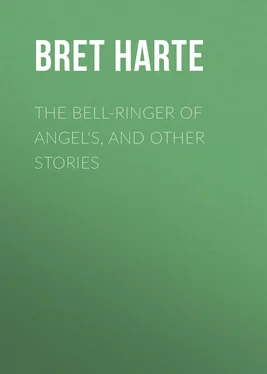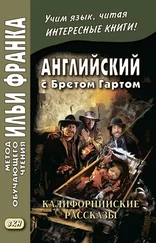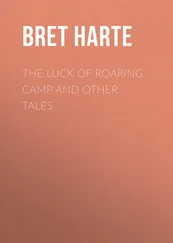Bret Harte - The Bell-Ringer of Angel's, and Other Stories
Здесь есть возможность читать онлайн «Bret Harte - The Bell-Ringer of Angel's, and Other Stories» — ознакомительный отрывок электронной книги совершенно бесплатно, а после прочтения отрывка купить полную версию. В некоторых случаях можно слушать аудио, скачать через торрент в формате fb2 и присутствует краткое содержание. Издательство: Иностранный паблик, Жанр: foreign_sf, literature_19, foreign_antique, foreign_prose, на английском языке. Описание произведения, (предисловие) а так же отзывы посетителей доступны на портале библиотеки ЛибКат.
- Название:The Bell-Ringer of Angel's, and Other Stories
- Автор:
- Издательство:Иностранный паблик
- Жанр:
- Год:неизвестен
- ISBN:нет данных
- Рейтинг книги:4 / 5. Голосов: 1
-
Избранное:Добавить в избранное
- Отзывы:
-
Ваша оценка:
- 80
- 1
- 2
- 3
- 4
- 5
The Bell-Ringer of Angel's, and Other Stories: краткое содержание, описание и аннотация
Предлагаем к чтению аннотацию, описание, краткое содержание или предисловие (зависит от того, что написал сам автор книги «The Bell-Ringer of Angel's, and Other Stories»). Если вы не нашли необходимую информацию о книге — напишите в комментариях, мы постараемся отыскать её.
The Bell-Ringer of Angel's, and Other Stories — читать онлайн ознакомительный отрывок
Ниже представлен текст книги, разбитый по страницам. Система сохранения места последней прочитанной страницы, позволяет с удобством читать онлайн бесплатно книгу «The Bell-Ringer of Angel's, and Other Stories», без необходимости каждый раз заново искать на чём Вы остановились. Поставьте закладку, и сможете в любой момент перейти на страницу, на которой закончили чтение.
Интервал:
Закладка:
But he was evidently too late for an interview. The windows were blank in the white light; only one—her bedroom—showed a light behind the lowered muslin blind. Her draped shadow once or twice passed across it. He was turning away with soft steps and even bated breath when suddenly he stopped. The exaggerated but unmistakable shadow of a man stood beside her on the blind.
With a fierce leap as of a maniac, he was at the door, pounding, rattling, and uttering hoarse and furious outcries. Even through his fury he heard quickened footsteps—her light, reckless, half-hysterical laugh—a bound upon the staircase—the hurried unbolting and opening of distant doors, as the lighter one with which he was struggling at last yielded to his blind rage, and threw him crashing into the sitting-room. The back door was wide open. He could hear the rustling and crackling of twigs and branches in different directions down the hillside, where the fugitives had separated as they escaped. And yet he stood there for an instant, dazed and wondering, “What next?”
His eyes fell upon McGee’s rifle standing upright in the corner. It was a clean, beautiful, precise weapon, even to the unprofessional eye, its long, laminated hexagonal barrel taking a tenderer blue in the moonlight. He snatched it up. It was capped and loaded. Without a pause he dashed down the hill.
Only one thought was in his mind now—the crudest, simplest duty. He was there in McGee’s place; he should do what McGee would do. God had abandoned him, but McGee’s rifle remained.
In a few minutes’ downward plunging he had reached the river bank. The tranquil silver surface quivered and glittered before him. He saw what he knew he would see, the black target of a man’s head above it, making for the Bar. He took deliberate aim and fired. There was no echo to that sharp detonation; a distant dog barked, there was a slight whisper in the trees beside him, that was all! But the head of the man was no longer visible, and the liquid silver filmed over again, without a speck or stain.
He shouldered the rifle, and with the automatic action of men in great crises returned slowly and deliberately to the house and carefully replaced the rifle in its old position. He had no concern for the miserable woman who had fled; had she appeared before him at the moment, he would not have noticed her. Yet a strange instinct—it seemed to him the vaguest curiosity—made him ascend the stairs and enter her chamber. The candle was still burning on the table with that awful unconsciousness and simplicity of detail which makes the scene of real tragedy so terrible. Beside it lay a belt and leather pouch. Madison Wayne suddenly dashed forward and seized it, with a wild, inarticulate cry; staggered, fell over the chair, rose to his feet, blindly groped his way down the staircase, burst into the road, and, hugging the pouch to his bosom, fled like a madman down the hill.
The body of Arthur Wayne was picked up two days later a dozen miles down the river. Nothing could be more evident and prosaic than the manner in which he had met his fate. His body was only partly clothed, and the money pouch and belt, which had been securely locked next his skin, after the fashion of all miners, was gone. He was known to have left the Bar with a considerable sum of money; he was undoubtedly dogged, robbed, and murdered during his journey on the river bank by the desperadoes who were beginning to infest the vicinity. The grief and agony of his only brother, sole survivor of that fraternal and religious partnership so well known to the camp, although shown only by a grim and speechless melancholy,—broken by unintelligible outbursts of religious raving,—was so real, that it affected even the callous camp. But scarcely had it regained its feverish distraction, before it was thrilled by another sensation. Alexander McGee had fallen from the deck of a Sacramento steamboat in the Straits of Carquinez, and his body had been swept out to sea. The news had apparently been first to reach the ears of his devoted wife, for when the camp—at this lapse of the old prohibition—climbed to her bower with their rude consolations, the house was found locked and deserted. The fateful influence of the promontory had again prevailed, the grim record of its seclusion was once more unbroken.
For with it, too, drooped and faded the fortunes of the Bar. Madison Wayne sold out his claim, endowed the church at the Cross Roads with the proceeds, and the pulpit with his grim, hopeless, denunciatory presence. The first rains brought a freshet to the Bar. The river leaped the light barriers that had taken the place of Wayne’s peaceful engines, and regained the old channel. The curse that the Rev. Madison Wayne had launched on this riverside Sodom seemed to have been fulfilled. But even this brought no satisfaction to the gloomy prophet, for it was presently known that he had abandoned his terror-stricken flock to take the circuit as revivalist preacher and camp-meeting exhorter, in the rudest and most lawless of gatherings. Desperate ruffians writhed at his feet in impotent terror or more impotent rage; murderers and thieves listened to him with blanched faces and set teeth, restrained only by a more awful fear. Over and over again he took his life with his Bible into his own hands when he rose above the excited multitude; he was shot at, he was rail-ridden, he was deported, but never silenced. And so, sweeping over the country, carrying fear and frenzy with him, scouting life and mercy, and crushing alike the guilty and innocent, he came one Sabbath to a rocky crest of the Sierras—the last tattered and frayed and soiled fringe of civilization on the opened tract of a great highway. And here he was to “testify,” as was his wont.
But not as he expected. For as he stood up on a boulder above the thirty or forty men sitting or lying upon other rocks and boulders around him, on the craggy mountain shelf where they had gathered, a man also rose, elbowed past them, and with a hurried impulse tried to descend the declivity. But a cry was suddenly heard from others, quick and clamoring, which called the whole assembly to its feet, and it was seen that the fugitive had in some blundering way fallen from the precipice.
He was brought up cruelly maimed and mangled, his ribs crushed, and one lung perforated, but still breathing and conscious. He had asked to see the preacher. Death impending, and even then struggling with his breath, made this request imperative. Madison Wayne stopped the service, and stalked grimly and inflexibly to where the dying man lay. But there he started.
“McGee!” he said breathlessly.
“Send these men away,” said McGee faintly. “I’ve got suthin’ to tell you.”
The men drew back without a word. “You thought I was dead,” said McGee, with eyes still undimmed and marvelously clear. “I orter bin, but it don’t need no doctor to say it ain’t far off now. I left the Bar to get killed; I tried to in a row, but the fellows were skeert to close with me, thinkin’ I’d shoot. My reputation was agin me, there! You follow me? You understand what I mean?”
Kneeling beside him now and grasping both his hands, the changed and horror-stricken Wayne gasped, “But”—
“Hold on! I jumped off the Sacramento boat—I was goin’ down the third time—they thought on the boat I was gone—they think so now! But a passin’ fisherman dived for me. I grappled him—he was clear grit and would have gone down with me, but I couldn’t let him die too—havin’ so to speak no cause. You follow me—you understand me? I let him save me. But it was all the same, for when I got to ‘Frisco I read as how I was drowned. And then I reckoned it was all right, and I wandered HERE, where I wasn’t known—until I saw you.”
“But why should you want to die?” said Wayne, almost fiercely. “What right have you to die while others—double-dyed and blood-stained, are condemned to live, ‘testify,’ and suffer?”
Читать дальшеИнтервал:
Закладка:
Похожие книги на «The Bell-Ringer of Angel's, and Other Stories»
Представляем Вашему вниманию похожие книги на «The Bell-Ringer of Angel's, and Other Stories» списком для выбора. Мы отобрали схожую по названию и смыслу литературу в надежде предоставить читателям больше вариантов отыскать новые, интересные, ещё непрочитанные произведения.
Обсуждение, отзывы о книге «The Bell-Ringer of Angel's, and Other Stories» и просто собственные мнения читателей. Оставьте ваши комментарии, напишите, что Вы думаете о произведении, его смысле или главных героях. Укажите что конкретно понравилось, а что нет, и почему Вы так считаете.












